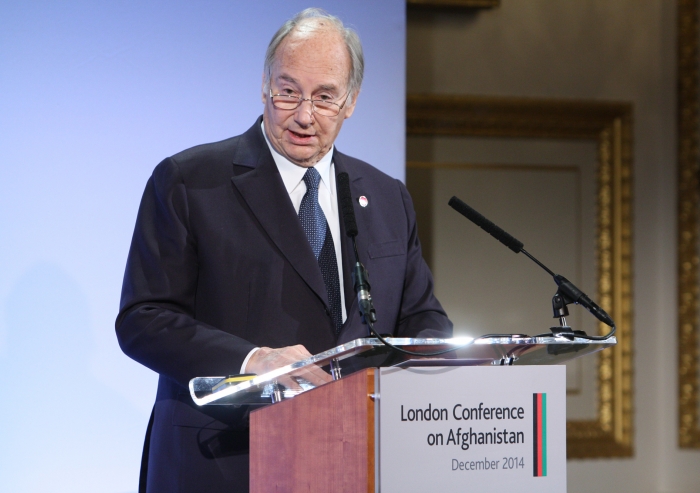London Conference on Afghanistan
Mr. Chairman,
Your Excellencies,
Distinguished guests,
Ladies and gentleme,
We express our sincere gratitude to the UK Government for organising the London Conference which has called upon the Afghan Government and the International Community at this critical time to review and prioritise policy directions for Afghanistan.
The Aga Khan Development Network joins in the wider sentiments expressed today for strong continued support for the development of a stable, progressive and plural Afghanistan. The challenges that face us in the fields of security, development and governance are all too clear and call for our collective wisdom and experience as we look ahead. We commend the strategy outlined by General McChrystal and underscore that stability and security can only be brought about through parallel and interrelated interventions in security, socio-economic development and governance.
In reflecting on the lessons learnt by the Aga Khan Development Network over the past seven years in Afghanistan, we would like to focus on a few key points drawing from our experience in the wider region, gained from extensive investments in development activities at the community, provincial and national levels:
- Much focus over the years has centred heavily on the capital, Kabul, and the central government. Insufficient attention has been paid to the real impact of the generous investments made by donor countries. Do enough Afghans perceive these investments as improving their quality of their life? It is vitally important to demonstrate that local governments and local actors working together with local communities can meet pressing needs. We know too well from experience in Afghanistan and elsewhere that nefarious elements gain the upper hand when there is a gap between the promise of state-supported services and their tangible delivery on the ground. Results change minds, not rhetoric. AKDN’s involvement in national programmes, such as the National Solidarity Programme, which place directly the onus of meeting development needs and setting priorities on communities, is showing remarkable progress, speaking to the entrepreneurial vigour of Afghans.
Community elected councils are not only driving processes that improve the quality of life but are playing an integral role in the birth and evolution of grass-roots civil society institutions that are able to govern themselves. Investing in the creation of such civil society institutions, and in their capacity to deliver services, deserves much greater attention, support and resources than has hitherto been the case, even as investments in rebuilding the state institutions continue.
- We note the tremendous vitality and resilience of Afghan entrepreneurship, which has enabled Afghans to endure and survive 23 years of war. Today, microfinance borrowers are still unable to access credit which would enable them to transit into small and medium enterprises. This is due to a variety of reasons, such as the fact that land cannot be used as capital due to the lack of an effective land ownership and registration framework. We encourage the Afghan Government to focus, as a priority, on creating the enabling conditions for private sector development and economic growth. The Enabling Environment Conference in 2007, hosted by AKDN and the Government of Afghanistan, defined a road map for private sector and social development. Resolving the issues identified and implementing the road map will undoubtedly accelerate socio-economic growth and development.
- Development planning needs to be tailored to the socio-economic and political needs and realities of each province. Afghanistan is diverse: culturally, ethnically and geographically. The equation for development that addresses challenges in Helmand, for example, will be very different from that for Badakhshan. Provincial level planning that examines economic potential and opportunities, social needs and access, as well as investments in provincial and district capacity building should not only begin to address more effectively the challenges at hand but also delineate roles and responsibilities among the key actors: PRTs, NGOs, Government etc. Security issues prevent access to many communities in the South and the South East but creating successful case studies in provinces where enabling conditions exist will provide a significant signal to other communities that change and development are possible, if there is willingness to cooperate.
- Although Afghanistan is recognised as a regional land bridge, east and west, north and south, there are still few tangible projects that speak to the realisation of this regional potential, as acknowledged at the meeting of the region’s Foreign Ministers in France in December 2008. AKDN is applying a regional approach to health, education, energy and infrastructure between the Badakhshans of Tajikistan and Afghanistan. Indeed such an investment would connect China to Kabul through Tajikistan, opening new trade corridors. That will inevitably have social and economic fall-out benefits for the communities and the country as a whole. Of our programmes and investments, we ask, how can we link the poor to growth and growth to the poor through subregional and regional investments? We submit that this requires willingness to support small-scale and middle-level investments in the short term that may not immediately be considered financially sustainable, but which our experience has shown would have the necessary medium to long term returns and economic benefits.
Overall we would emphasise four fundamental building blocks necessary to achieve a minimum critical mass of interventions that would improve Afghans’ quality of life and opportunities: security; participation; ownership (both of assets and the development process); and institution building of the state and civil society. If resources allocated to each of these elements were better balanced, much more would be achieved by development efforts across the country.
With over US$ 150 million spent in Afghanistan from a total AKDN pledge of US$ 200 million by His Highness the Aga Khan, the Aga Khan Development Network remains committed to the stability and growth of this important country and its people.







